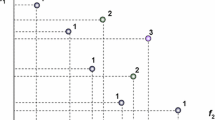Abstract
In this study, a problem space genetic algorithm (PSGA) is used to solve bicriteria tool management and scheduling problems simultaneously in flexible manufacturing systems. The PSGA is used to generate approximately efficient solutions minimizing both the manufacturing cost and total weighted tardiness. This is the first implementation of PSGA to solve a multiobjective optimization problem (MOP). In multiobjective search, the key issues are guiding the search towards the global Pareto-optimal set and maintaining diversity. A new fitness assignment method, which is used in PSGA, is proposed to find a well-diversified, uniformly distributed set of solutions that are close to the global Pareto set. The proposed fitness assignment method is a combination of a nondominated sorting based method which is most commonly used in multiobjective optimization literature and aggregation of objectives method which is popular in the operations research literature. The quality of the Pareto-optimal set is evaluated by using the performance measures developed for multiobjective optimization problems.
Similar content being viewed by others
References
Akturk, M. S. and Avci, S. (1996) Tool allocation and machining conditions optimization for CNC machines. European Journal of Operational Research, 94(2), 335-348.
Akturk, M. S. and Ozkan, S. (2001) Integrated scheduling and tool management in flexible manufacturing systems. International Journal of Production Research, 39(12), 2697-2722.
Bernardo, J. J. and Lin, K.-S. (1994) An interactive procedure for bi-criteria production scheduling. Computers & Operations Research, 21(6), 677-688.
Deb, K. and Goel, T. (2000) Controlled elitist non-dominated sorting genetic algorithms for better convergence. Technical Report 200004, Kanpur Genetic Algorithms Laboratory (KanGAL). (http://www.iitk.ac.in/kangal/pub.htm).
Gray, A. E., Seidman, A. and Stecke, K. E. (1993) A synthesis of decision models for tool management in automated manufacturing. Management Science, 39(5), 549-567.
Hajela, P. and Lin, C.-Y. (1992) Genetic search strategies in multicriterion optimal design. Structural Optimization, 4, 99-107.
Hansen, M. P. and Jaszkiewicz, A. (1998) Evaluating the quality of approximations to the non-dominated set. IMM Technical report, Technical University of Denmark. (http://www-idss.cs.put.poznan.pl/~jaszkiewicz/pub.html).
HTML/2001/03/297.html ).
Schaffer, J. D. (1985) Multiple objective optimization with vector evaluated genetic algorithms, in Proceedings of an International Conference on Genetic Algorithms and Their Applications, Grefenstette J. J. (ed.), pp. 93-100.
Srinivas, N. and Deb, K. (1994) Multiobjective optimization using nondominated sorting in genetic algorithms. Evolutionary Computation, 2(3), 221-248.
Storer, R. H., Wu, S. D. and Vaccari, R. (1992) New search spaces for sequencing problems with application to job shop scheduling. Management Science, 38(10), 1495-1509.
Tiwari, M. K. and Vidyarthi, N. K. (2000) Solving machine loading problems in a flexible manufacturing system using a genetic algorithm based heuristic approach. International Journal of Production Research, 38(14), 3357-3384.
Turkcan, A., Akturk, M. S. and Storer, R. H. (2001) A problem space genetic algorithm to solve bicriteria scheduling in flexible manufacturing systems. Technical Report IEOR-0101, Bilkent University.
Van Veldhuizen, D. A. and Lamont, G. B. (2000) Multiobjective evolutionary algorithms: Analyzing the state-of-the-art. Evolutionary Computation, 8(2), 125-147.
Zitzler, E. (1999) Evolutionary algorithms for multiobjective optimization. PhD thesis, Swiss Federal Institute of Technology Zurich. (http://www.lania.mx/~ccoello/EMOO/EMOObib.html).
Zitzler, E. and Thiele, L. (1998) Multiobjective optimization using evolutionary algorithms\3-a comparative case study, in Fifth International Conference on Parallel Problem Solving from Nature (PPSN-V), pages 292-301, Springer, Berlin. (http://www.lania.mx/~ccoello/EMOO/EMOObib.html).
Author information
Authors and Affiliations
Rights and permissions
About this article
Cite this article
Turkcan, A., Akturk, M.S. A problem space genetic algorithm in multiobjective optimization. Journal of Intelligent Manufacturing 14, 363–378 (2003). https://doi.org/10.1023/A:1024605927329
Issue Date:
DOI: https://doi.org/10.1023/A:1024605927329




